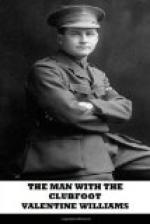I thrust the pin of the badge into my braces and fastened it there, crammed the rest of the dead man’s effects into his bag, stuck his hat upon my head and threw his overcoat on my arm, picked up his bag and crept away. In another minute I was back in my room, my brain aflame with the fire of a great enterprise.
Here, to my hand, lay the key of that locked land which held the secret of my lost brother. The question I had been asking myself, ever since I had first discovered the dead man’s American papers of identity, was this. Had I the nerve to avail myself of Semlin’s American passport to get into Germany? The answer to that question lay in the little silver badge. I knew that no German official, whatever his standing, whatever his orders, would refuse passage to the silver star of Section Seven. It need only be used, too, as a last resource, for I had my papers as a neutral. Could I but once set foot in Germany, I was quite ready to depend on my wits to see me through. One advantage, I knew, I must forgo. That was the half-letter in its canvas case.
If that document was of importance to Section Seven of the German Police, then it was of equal, nay, of greater importance to my country. If I went, that should remain behind in safe keeping. On that I was determined.
“Never before, since the war began,” I told myself, “can any Englishman have had such an opportunity vouchsafed to him for getting easily and safely into that jealously guarded land as you have now! You have plenty of money, what with your own and this ...” and I fingered Semlin’s wad of notes, “and provided you can keep your head sufficiently to remember always that you are a German, once over the frontier you should be able to give the Huns the slip and try and follow up the trail of poor Francis.
“And maybe,” I argued further (so easily is one’s better judgment defeated when one is young and set on a thing), “maybe in German surroundings, you may get some sense into that mysterious jingle you got from Dicky Allerton as the sole existing clue to the disappearance of Francis.”
Nevertheless, I wavered. The risks were awful. I had to get out of that evil hotel in the guise of Dr. Semlin, with, as the sole safeguard against exposure, should I fall in with the dead man’s employers or friends, that slight and possibly imaginative resemblance between him and me: I had to take such measures as would prevent the fraud from being detected when the body was discovered in the hotel: above all, I had to ascertain, before I could definitely resolve to push on into Germany, whether Semlin was already known to the people at the hotel or whether—as I surmised to be the case—this was also his first visit to the house in the Vos in’t Tuintje.
In any case, I was quite determined in my own mind that the only way to get out of the place with Semlin’s document without considerable unpleasantness, if not grave danger, would be to transfer his identity and effects to myself and vice versa. When I saw the way a little clearer I could decide whether to take the supreme risk and adventure myself into the enemy’s country.




